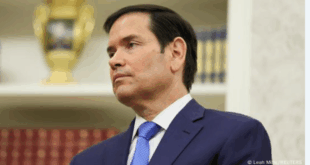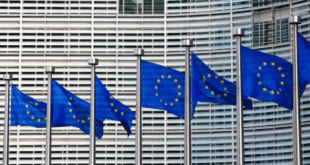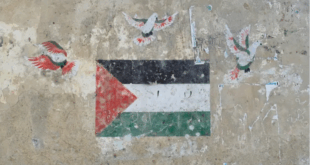
وال استریت جورنال, 2 ژانویه2018 –ساعت0140 سوم ژانویه به وقت اروپا – سرمقاله – اعتراضات ضد حکومتی بعد از شش روز در سراسر ایران ادامه دارد و آخوندهای حاکم و سپاه پاسداران تهدید به یک سرکوبی میکنند که میتواند می تواند وضعیت نامطلوبی را ایجاد کند.
جهان باید از این مبارزه برای آزادی که توهمات در رابطه با ایران که بر دولت اوباما غالب بود را فاش می کند, حمایت نماید.
شروع با این ادعا بود که امضای یک توافقنامه هسته ای با رژیم تهران رفتارش را مدره خواهد کرد.
بن رودز فروشنده[مبلغ] اصلی سیاست خارجه رئیس جمهور اوباما در ماه ژوئن 2015 گفت که ” جهانی که در آن یک توافقنامه با ایران وجود داشته باشد خیلی محتمل تر است که یک تحول در رفتار ایران بوجود بیاورد تا دنیایی که در آن هیچ توافقنامه ای وجود نداشته باشد.“
آقای اوباما گفت این توافقنامه ”میتواند رهبران میانه روتر در ایران را تقویت کند.“ و کالین کال مشاور امنیت ملی معاون رئیس جمهور جو بایدن, در سال 2015 گفت که ایرانیان ”اکثریت عظیم پول را نه برای تسلیحات بلکه بیشتر آن برای تهیه کره[معیشت مردم] صرف خواهد شد.“
برای این هدف بود که با توافقنامه هسته ای, تحریمهای بین المللی برداشته شد و صد میلیارد دلار سرمایه ایران از انجماد خارج شد.
اما به جای اینکه از پول استفاده کنند تا زندگی ایرانیان را بهبود بخشند, تهران از ثروت بادآورده خود استفاده کرد تا از ارباب رجوعهایی که سرتاسر منطقه دردسر ایجاد میکردند, پشتیبانی کند.
آخوندها میلیاردها صرف کردند تا از بشار اسد سوریه با نیرو, تسلیحات و محموله های نفت حمایت کنند. ایران شبه نظامیان شیعه در عراق, تروریستهای حزب الله در سوریه و لبنان و جنگجویان حوثی در یمن را تأمین مالی میکند.
اعتراض کنندگان در خیابانهای تهران, قم, شیراز و دیگر شهرها صریحا این ماجراجویی را رد میکنند, و شعارهایی میدهند مانند ”سوریه را رها کن, فکری به حال ما کن!“ آنها یک اقتصاد بهتر و فرصتهای بیشتر برای کودکانشان میخواهند نه کمپینهایی برای ساختن یک امپراتوری شیعه در سراسر خاورمیانه.
توهم از بین رفته دیگر این است که تفاوتی در سیاست بین ولی فقیه آیت الله علی خامنه ای و رئیس جمهور به اصطلاح مدره حسن روحانی وجود دارد.
آقای روحانی درباره گوش دادن به اعتراض کنندگان صحبت میکند, ولی این تنها تا زمانی دوام دارد که آیت الله سایر فرمانها را بدهد.
دولت روحانی به توافقنامه هسته ای با دستگیری مدافعان دمکراسی و گروگان گرفتن شهروند آمریکایی مانند چیووه وانگ, یک دانشجوی دکترای پرینستون و پدر و پسر باقر و سیامک نمازی پاسخ داد.
تظاهر کنندگان هیچ تفاوتی بین آقای روحانی و آخوندها قائل نیستند.
تظاهراتها همچنین توهمی که توسط آقای رودز تبلیغ می شد که سیاست قویتر پرزیدنت ترامپ در قبال ایران, رژیم را با مردم ایران در مخالفت با آمریکا متحد می کند را افشا کرده است.
هدف خشم اعتراض کنندگان, حاکمان خودشان بخاطر فساد و هدر دادن آنچه به آنها گفته میشد که محصولات توافقنامه هسته ای است می باشد.
آقای ترامپ, تازه وارد سیاست خارجی مفروض, این را بهتر از آقای اوباما می فهمد و [کنترل تسلیحات پیچیده میشود].
آقای اوباما به دنبال این بود که رژیم تهران را با پرهیز از رویارویی و گذاشتن اینکه ایران در سوریه و جاهای دیگر خط خودش را برود. هدف وی فراتر از هر چیز دیگری رسیدن به توافق هسته ای بود.
در مقابل, آقای ترامپ بین رژیم و مردم ایران تفاوت قائل شده و تفکیک کرده است, مانند آنچه رونالد ریگان با شوروی کرد. در سخنرانیها طی سال گذشته رئیس جمهور به رژیم بخاطر مشکل آفرینی خارجی و منکوب کردن مردمش اعتراض کرده است.
آقای ترامپ در سپتامبر به سازمان ملل متحد گفت, ”تمام دنیا درک میکند که مردم خوب ایران خواهان تغییرند و به غیر از نیروی عظیم نظامی ایالات متحده, آنچه رهبران ایران از همه بیشتر از آن میترسند مردم ایران هستند. این آن چیزی است که باعث میشود رژیم دسترسی به اینترنت را محدود کند, بشقابهای ماهواره را از بین ببرد, به دانشجویان معترض غیر مسلح شلیک کند, و اصلاح طلبان سیاسی را زندانی کند.“
توئیتهای آقای ترامپ از زمانی که اعتراضات شروع شد ممکن است خوش آیند اوباما نباشد ولی آنها آمریکا را در طرف مردم ایران قرار داده نه این رژیم.
این حمایت لفظی برای آنهایی که در خیابان هستند مهم است, و اروپاییها و دمکراتها در کنگره باید به این کر بپیوندند.
آمریکا همچنین میتواند تکنولوژی فراهم کند تا به ایرانیان کمک کند که دیواره آتش و سانسور اینترنت رژیم را دور بزنند. و میتواند هزینه مداخلات ایران در سراسر خاورمیانه را بالا ببرد.
ایرانیها باید آزادی خودشان را بدست بیاورند ولی آمریکاییها میتوانند با پذیرفتن اینکه این یک جنگ بین مدره ها و ”تندروها“ یا تهران در مقابل ترامپ نیست, کمک کنند.
این جنگی است بین مردم که آزادی میخواهند و سرکوب کنندگانشان.
ترجمه، کامل و متن قابل استناد و نقل قول است
Busting Illusions About Iran
Trump puts America on the side of the people, not the Ayatollahs.
President Donald Trump speaking on his national security strategy at the Ronald Reagan Building in Washington, Dec. 18, 2017. Photo: saul loeb/Agence France-Presse/Getty Images
By
The Editorial Board
Jan. 2, 2018 7:40 p.m. ET
Anti-government protests continue across Iran after six days, and the ruling mullahs and Iranian Revolutionary Guard Corps (IRGC) are threatening a crackdown that could get ugly.
The world should support this fight for freedom, which is exposing the illusions about Iran that dominated the Obama Administration.
Start with the claim that signing a nuclear deal with the Tehran regime would moderate its behavior.
Ben Rhodes, President Obama’s chief foreign-policy salesman, said in June 2015 that “a world in which there is a deal with Iran is much more likely to produce an evolution in Iranian behavior, than a world in which there is no deal.”
Mr. Obama said the pact “could strengthen the hands of more moderate leaders in Iran.”
And Vice President Joe Biden’s national security adviser Colin Kahl said in 2015 that the Iranians “are not going to spend the vast majority of the money on guns, most of it will go to butter.”
Toward that end, the nuclear pact lifted international sanctions and unfroze $100 billion in Iranian assets.
Yet instead of using the money to improve the lives of Iranians, Tehran has used its windfall to back clients making trouble throughout the region.
The mullahs have spent billions propping up Syria’s Bashar Assad with troops, weapons and energy shipments.
Iran funds Shiite militias in Iraq, Hezbollah terrorists in Syria and Lebanon, and Houthi fighters in Yemen.
The protesters in the streets of Tehran, Qom, Shiraz and other cities are explicitly rejecting this adventurism, shouting slogans like “Leave Syria, think of us!” They want a better economy and more opportunities for their children, not campaigns to build a Shiite empire across the Middle East.
Another busted illusion is that there is a difference in policy between Supreme Leader Ayatollah Ali Khamenei and the supposedly moderate President Hasan Rouhani.
Mr. Rouhani talks about listening to the protesters, but that will last only until the Ayatollah gives other orders.
The Rouhani government has responded to the nuclear deal by arresting democracy advocates and taking American hostages like Xiyue Wang, a Princeton PhD student, and father and son Baquer and Siamak Namazi.
The protesters are making no distinction between Mr. Rouhani and the mullahs.
The demonstrations have also exposed the illusion peddled by Mr. Rhodes that President Trump’s more muscular policy toward Iran has united the regime with the Iranian public in opposition to the U.S.
The ire of the protesters is aimed at their own rulers for corruption and wasting what they were told would be the fruits of the nuclear deal.
Mr. Trump, the supposed foreign-policy bumpkin, understands this better than Mr. Obama and the arms-control sophisticates.
Mr. Obama sought to win over the Tehran regime by avoiding confrontation and letting Iran have its way in Syria and elsewhere. His goal above all else was the nuclear deal.
Mr. Trump, by contrast, has distinguished between the regime and the Iranian people, much as Ronald Reagan did with the Soviet Union.
In speeches over the past year, the President has called out the regime for stirring up foreign trouble and subjugating its people.
“The entire world understands that the good people of Iran want change, and, other than the vast military power of the United States, that Iran’s people are what their leaders fear the most,” Mr. Trump told the United Nations in September.
“This is what causes the regime to restrict internet access, tear down satellite dishes, shoot unarmed student protestors, and imprison political reformers.”
Mr. Trump’s tweets since the protests began may not be Obama-smooth but they have put America on the side of the people, rather than the regime.
This rhetorical support matters to those in the street, and Europeans and Democrats in Congress should join the chorus.
The U.S. can also provide technology to help Iranians get around the regime’s internet firewall and censorship. And it can raise the cost of Iran’s interventions around the Middle East.
Iranians will have to earn their own freedom, but Americans can help by admitting that this isn’t a fight between moderates and “hardliners” or Tehran vs. Trump. It’s a fight between people who want liberty and their oppressors.
 آفتابكاران اخبار و مقالات درباره ايران و مقاومت
آفتابكاران اخبار و مقالات درباره ايران و مقاومت




